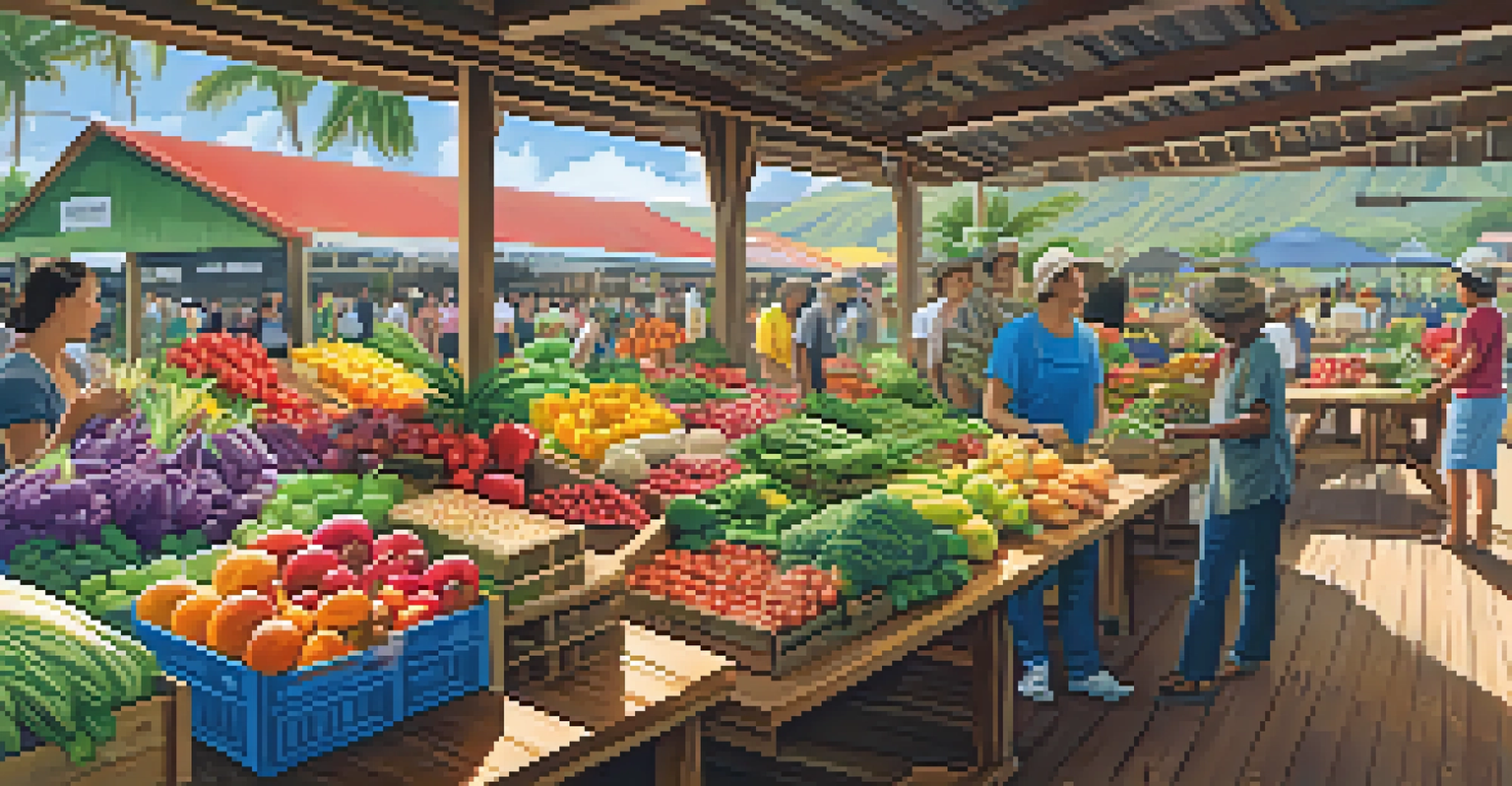Innovations in Hawaii's Agriculture for Economic Resilience

The Role of Agriculture in Hawaii's Economy
Agriculture has long been a cornerstone of Hawaii's economy, contributing to both local food security and employment. Despite facing challenges like climate change and market fluctuations, the sector remains vital for sustaining livelihoods across the islands. In recent years, innovative approaches have emerged, helping farmers adapt and thrive in this unique environment.
Agriculture is the foundation of our economy and a source of pride for our community.
From taro fields to coffee plantations, Hawaii’s agriculture is as diverse as its landscapes. This diversity not only enriches local culture but also attracts tourists seeking authentic experiences. As the state grapples with global economic pressures, strengthening agriculture becomes essential for long-term resilience.
Investing in agriculture means investing in the community. By supporting local farmers and producers, Hawaii can reduce its dependency on imported goods while enhancing food sovereignty. This shift not only boosts the economy but also fosters a sense of pride in local produce and traditions.
Embracing Sustainable Farming Practices
Sustainable farming practices are gaining traction in Hawaii, as farmers seek to minimize environmental impacts while maximizing yields. Techniques like crop rotation, cover cropping, and organic farming are not only better for the land but also appeal to increasingly eco-conscious consumers. These methods help restore soil health and promote biodiversity.

Moreover, sustainability isn’t just a trend; it's becoming a necessity. With rising sea levels and changing weather patterns, Hawaii's farmers must adapt their practices to ensure resilience against these challenges. Implementing sustainable methods allows for more reliable harvests and mitigates the effects of climate change.
Agriculture's Economic Importance
Hawaii's agriculture is essential for local food security and employment, helping sustain livelihoods across the islands.
By fostering a culture of sustainability, Hawaii can position itself as a leader in eco-friendly agriculture. This shift not only benefits the environment but also attracts tourists interested in sustainable practices, further boosting the economy. It's a win-win situation that showcases the islands' commitment to preserving their natural resources.
Innovative Crop Varieties for Changing Climates
In response to climate change, researchers and farmers in Hawaii are experimenting with innovative crop varieties that can withstand extreme weather conditions. These new strains are designed to be more resilient to drought, pests, and diseases, ensuring a stable food supply. For example, scientists are developing drought-resistant taro that can thrive in drier conditions.
Sustainable farming is not just a choice; it's a necessity for future generations.
The introduction of these resilient crops not only secures food production but also opens up new market opportunities. Farmers can diversify their offerings, catering to both local and global markets. This diversification is crucial for economic resilience as it reduces reliance on a single crop or export.
Moreover, these innovations promote the idea of adaptability in agriculture. By embracing new technologies and research, Hawaii’s farmers can better navigate the uncertainties of climate change, ensuring that agriculture remains a viable and profitable endeavor for future generations.
Technology in Agriculture: A Game Changer
The integration of technology into agriculture is revolutionizing the way farmers operate in Hawaii. Precision agriculture, for instance, utilizes data and analytics to optimize crop production, leading to higher yields and reduced waste. Tools like drones and soil sensors help farmers monitor their fields more effectively, making informed decisions that enhance productivity.
Additionally, technology can streamline supply chains, connecting local farmers directly with consumers. Online marketplaces and delivery apps allow fresh produce to reach homes faster, reducing the time between harvest and consumption. This not only supports local economies but also encourages consumers to choose local products over imports.
Sustainable Practices for Resilience
Embracing sustainable farming methods is vital for Hawaii's farmers to adapt to climate change and ensure long-term productivity.
As technology continues to evolve, its role in agriculture will only expand. Embracing these innovations can help Hawaii's agricultural sector remain competitive in a global market while ensuring sustainability and efficiency. The future of farming in Hawaii is bright, thanks to the marriage of tradition and technology.
Community Supported Agriculture (CSA) Initiatives
Community Supported Agriculture (CSA) programs are gaining popularity across Hawaii, connecting consumers directly with local farmers. These initiatives allow individuals to purchase shares of a farm's harvest, fostering a sense of community and mutual support. CSAs help ensure that farmers receive stable income while providing fresh, seasonal produce to consumers.
Through CSAs, residents gain access to a variety of locally grown foods, which enhances food security and reduces reliance on imports. This model not only supports sustainable farming practices but also promotes a healthier lifestyle by encouraging the consumption of fresh fruits and vegetables.
Moreover, CSAs often include educational components, teaching participants about sustainable practices, cooking tips, and the importance of supporting local agriculture. By engaging the community in these initiatives, Hawaii can strengthen its agricultural resilience and build a more sustainable food system.
Agro-Tourism: A Path to Economic Growth
Agro-tourism is emerging as a promising avenue for economic growth in Hawaii's agricultural sector. This concept encourages visitors to engage with farms and learn about local agriculture, providing farmers with an additional revenue stream. Activities such as farm tours, tastings, and workshops attract tourists while promoting awareness of local food systems.
By showcasing the beauty and diversity of Hawaiian agriculture, farmers can enhance their connection with the community and visitors alike. Agro-tourism not only benefits farmers financially but also fosters a greater appreciation for the hard work that goes into food production. It's a way to tell the story of Hawaii's rich agricultural heritage.
Agro-Tourism Boosts Local Economy
Agro-tourism initiatives provide farmers with additional revenue streams while promoting awareness of local agriculture among visitors.
Furthermore, agro-tourism can lead to increased demand for local produce. As tourists experience the flavors of Hawaii, they may be inspired to seek out local products when they return home. This can create a lasting impact on the economy, supporting farmers and local businesses in the long run.
Collaborative Efforts for Agricultural Resilience
Collaboration among farmers, researchers, and government agencies is crucial for enhancing agricultural resilience in Hawaii. By working together, these stakeholders can share knowledge, resources, and best practices that strengthen the entire sector. Initiatives such as workshops and conferences facilitate networking and the exchange of innovative ideas.
Moreover, partnerships with educational institutions can lead to research that addresses specific challenges faced by farmers. This collaboration helps develop solutions tailored to Hawaii’s unique agricultural environment, ensuring that farmers have the support they need to adapt and thrive. Programs focused on sustainable practices and technology adoption can further enhance this resilience.

As the agricultural landscape evolves, fostering a spirit of collaboration is key. By uniting various players in the agricultural community, Hawaii can create a robust support system that not only addresses current challenges but also paves the way for a resilient future.